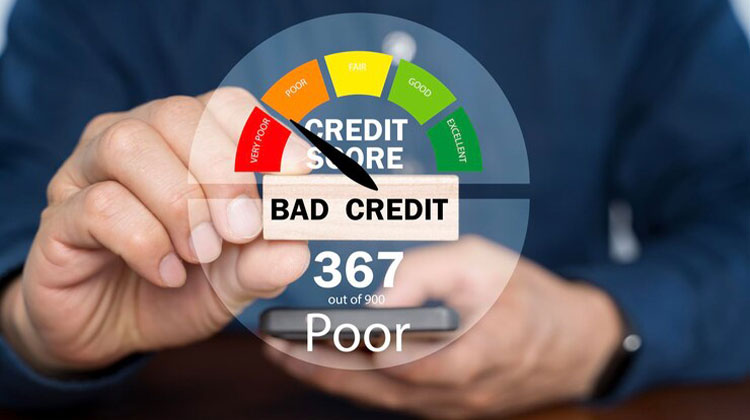Credit scores are calculated based on the information contained in your credit reports, so it’s common to see your score change when lenders update that information. A small drop in your credit score might not be a cause for concern, especially if you’re maintaining good credit habits. Here are some possible reasons why did my credit score dropped.
Why Did My Credit Score Drop? 5 Common Reasons
Payment History
The factor that determines your credit score the most is whether you’ve had a track record of regular payments. Before offering you the loan, banks want to know they can trust you to pay the monthly payments. For this reason, payment delays and missed payments are among the leading reasons for a credit score drop. One missed payment could have a huge impact. The later the payment is due, the more it will affect your credit score.
To avoid missed payments, set reminders that recur on your smartphone, write them on your personal calendar, or use automatic payments. If you miss your payment, pay it as soon as you can to minimize the impact on your credit score.
Also read: 4 Best Metal Credit Cards: Which Is Right for You
Credit Utilization
If you’re carrying at least one credit card, then you are aware that each card comes with an upper limit on spending. The credit limit is the sum of money that you can borrow. Credit utilization is a measurement of the amount of credit limit you’re currently using.
A large portion of your available credit could affect your credit score. To improve your score, try to limit your credit utilization to 30 percent. A credit card that is maxed out can significantly decrease your credit score and make lenders reluctant to offer loans. If you’re looking to build an excellent credit score, you should pay down the balances on your credit cards. It is also possible to request an increase in the credit limit. So you don’t use it, it will reduce your credit utilization. We’ve put together the following list of strategies to save money to ensure you have more money to pay off your debt.
Credit History Length
If you don’t own a credit card and you don’t know it, you could damage your credit score. Credit history is the length of time that you’ve paid your bills on time and managed your loans. Paying monthly rent and cell phone bills, and utility bills is one way to establish a credit history. Responsible management of your credit card is a different way to build. It is impossible to go back to the past and begin your credit history earlier. Therefore, be patient, and your score will slowly improve.
Apply for a New Credit card
Don’t be rushed into opening five new credit card accounts, thinking it will help build credit history or boost your credit utilization rate. Although a lack of credit history can result in a lower credit score, it is also possible to open several new accounts in an extremely short amount of time. Take care to manage the accounts you already have and gradually open new ones when you want.
If you are applying for credit, the lender will conduct an investigation that can temporarily lower your credit score. Too many hard inquiries within a short time frame is a red flag for lenders since it could indicate that you are in financial difficulty. Apply for a new credit card, but be careful and allow some time between applications.
Lack of Credit Mix
You’ve proved that you can control your credit cards, which banks appreciate. But what they really want is the proof that you can manage a range of credit types. student loans, car loans, and a mortgage all create a mixture of debt that banks are reassured by.
There’s nothing it is possible to do about improving your credit score except for the fact that you require these loans. Simply focus on managing your credit responsibly, and your credit mix will change.
Some Other Reasons: Why is My Credit Score Going Down
If you notice that suddenly drop your credit score, you’ll need to take a look. Here are four reasons why my credit score dropped.
- There are mistakes on your credit report. It’s crucial to check your report to ensure accuracy. Make sure to correct any errors you find to prevent any damage to your credit score.
- You’re closing existing credit cards. Closing old accounts could reduce your credit history and decrease your available credit, and reduce your credit score.
- It is possible to let a credit card collection account go unnoticed. Public records and collection accounts could significantly harm credit scores.
- You are a victim of identity theft. A credit card skimmer uses your personal information to create accounts or to make purchases and wreak destruction on your credit. Pay attention to your accounts using mobile banking.
Also read: Top 10 Rewards Debit Cards
What Doesn’t Affect Your Credit Score
Before we go over the various factors that affect your credit score, it’s time to clear the most common myths about credit scores. Whatever you have heard, these factors do not affect the credit scores of your clients.
- Your income: Although a greater income may help you manage the burden of debt, it does not directly affect your credit score.
- Your age: Age isn’t an important factor when it comes to credit score models.
- Checking your own credit report: Checking your credit report is viewed as a “soft inquiry” and does not affect your score.
- Personal information: Race, gender, marital status, or religion. These factors are not considered in credit scoring.
How to Improve Your Credit Score
Rebuilding your credit score takes time, patience, and consistency. Here’s a simple plan to start improving today:
- Pay all bills on time. Even one late payment can slow progress.
- Reduce debt. Focus on high-interest credit cards first.
- Become an authorized user. Leverage a family member’s positive payment history.
- Use a secured credit card. Great for rebuilding damaged credit.
- Track your progress. Monitor your credit score and reports regularly for accuracy.
- Increase your savings. Consider bank products like cash-back accounts or high-interest checking to grow your financial cushion.
FInal word
If you’re still wondering, “Why did my credit score drop, and how can I fix it fast?”. From missed payments or high credit utilization rates to unexpected account errors, knowing what caused it helps you take immediate steps toward rectifying it.
Remember, your credit score isn’t static – it merely reflects how your financial habits have developed over time. By paying on time and paying down debt responsibly while keeping old accounts open as well as monitoring credit reports regularly, you can rebuild and strengthen your score over time and improve financial security in general.
FAQs: Why Did My Credit Score Drop
Does checking my credit score lower it?
No, checking your own credit is a soft inquiry and doesn’t affect your score.
Can one late payment lower my credit score?
Yes, a single late payment can drop your score by 60–100 points temporarily.
What is a good credit score range?
A good FICO score is between 670 and 739.
Can I get approved for a loan with a low credit score?
Yes, but lenders may charge higher interest rates or require a cosigner.















Leave a comment